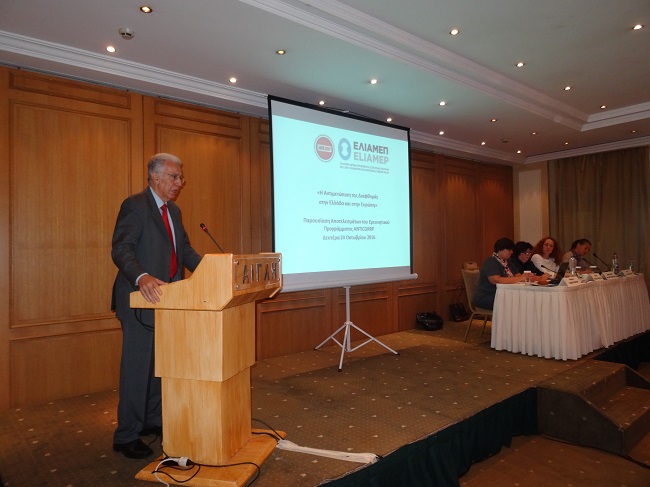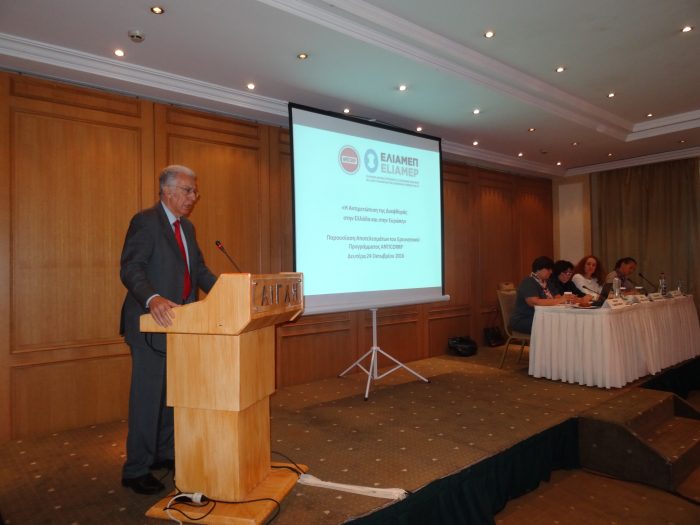 On 24 October 2016, ELIAMEP organised a conference entitled ‘Controlling Corruption in Greece and in Europe’. The conference took place in the framework of the Anticorrp project (www.anticorrp.eu) and served to present key findings of the research that was carried out in its context.
On 24 October 2016, ELIAMEP organised a conference entitled ‘Controlling Corruption in Greece and in Europe’. The conference took place in the framework of the Anticorrp project (www.anticorrp.eu) and served to present key findings of the research that was carried out in its context.
The conference started with a brief presentation of Anticorrp by Dia Anagnostou, Assistant Professor at Panteion University. Nikiforos Diamandouros, European Ombudsman for the period 2003-2013 and member of the Academy of Athens, offered some welcoming remarks. Alina Mungiu-Pippidi, professor of policy analysis and democracy at Hertie School of Governance, then took the floor. According to evidence from comparisons across countries, effective control of corruption requires more than the adoption of specific tools and strict legal regulations. It relies on a balance between a state calibrated to reduce opportunities for corrupt practices and a society’s capacity to hold its government accountable. The public integrity index that has been produced as part of the project seeks to reflect the balance of measures required. It consists of 6 components: judicial independence, administrative burden, trade openness, budget transparency, e-citizenship and freedom of the press. Maria Gavouneli, Assistant Professor at the National Kapodistrian University of Athens, subsequently discussed the characteristics that domestic legislation needs to have in order to be able to effectively curb corruption.
Part II of the conference focused on the findings of ELIAMEP’s contribution to the project. Dimitri A. Sotiropoulos, Associate professor at the National Kapodistrian University of Athens, discussed corruption and accountability in Greece. D.A. Sotiropoulos argued that the economic crisis has generated pressure for tackling corruption. From 2011 onward, substantive legislative efforts have been made to cover loopholes in the legal framework and reinforce institutional capacity for control. Efforts to combat corruption however have gone hand in hand with party competition and the use of the legal and institutional anti-corruption arsenal as a means to target rival political parties and politicians. Dia Anagnostou and Dr Evangelia Psychogiopoulou, lawyer and researcher at ELIAMEP, subsequently presented their study on the regulation of political financing in Europe and EU Member States’ compliance with the relevant recommendations of the Group of States Against Corruption (GRECO). Although most European countries possess a basic regulatory framework on the financing of political parties, considerable differences exist between the EU Member States as regards the volume of regulation and the restrictions introduced. Quite importantly, the relationship between the regulatory framework for political financing and the ability of states to control corruption appears to be inversely proportional: countries that have a rudimentary or moderate regulatory framework tend to be more effective in controlling corruption in general than those countries enjoying a dense regulatory framework. Yannis Androulakis, lecturer at the National Kapodistrian University of Athens, then discussed the contribution of penal law to the fight against corruption in Greece. He gave an overview of the improvements and modifications that have been recently brought to the legal framework and also pointed to the deficiencies of the existing anti-corruption framework, referring for instance to the legislator’s excessive severity, the absence of sufficient resources for fighting corruption or the lack of legal stability. Dr Thanasis Ksiros, lawyer, presented the legal framework on the financing of political parties in Greece and its evolution. In particular, he discussed key legislative changes brought by Law 4304/2014 and made an overall assessment of the quality of domestic legislation and the monitoring of its implementation.
Speakers’ presentations allowed for lively debate. For more information on the conference, you can contact Dia Anagnostou ([email protected]) and Evangelia Psychogiopoulou ([email protected]).



